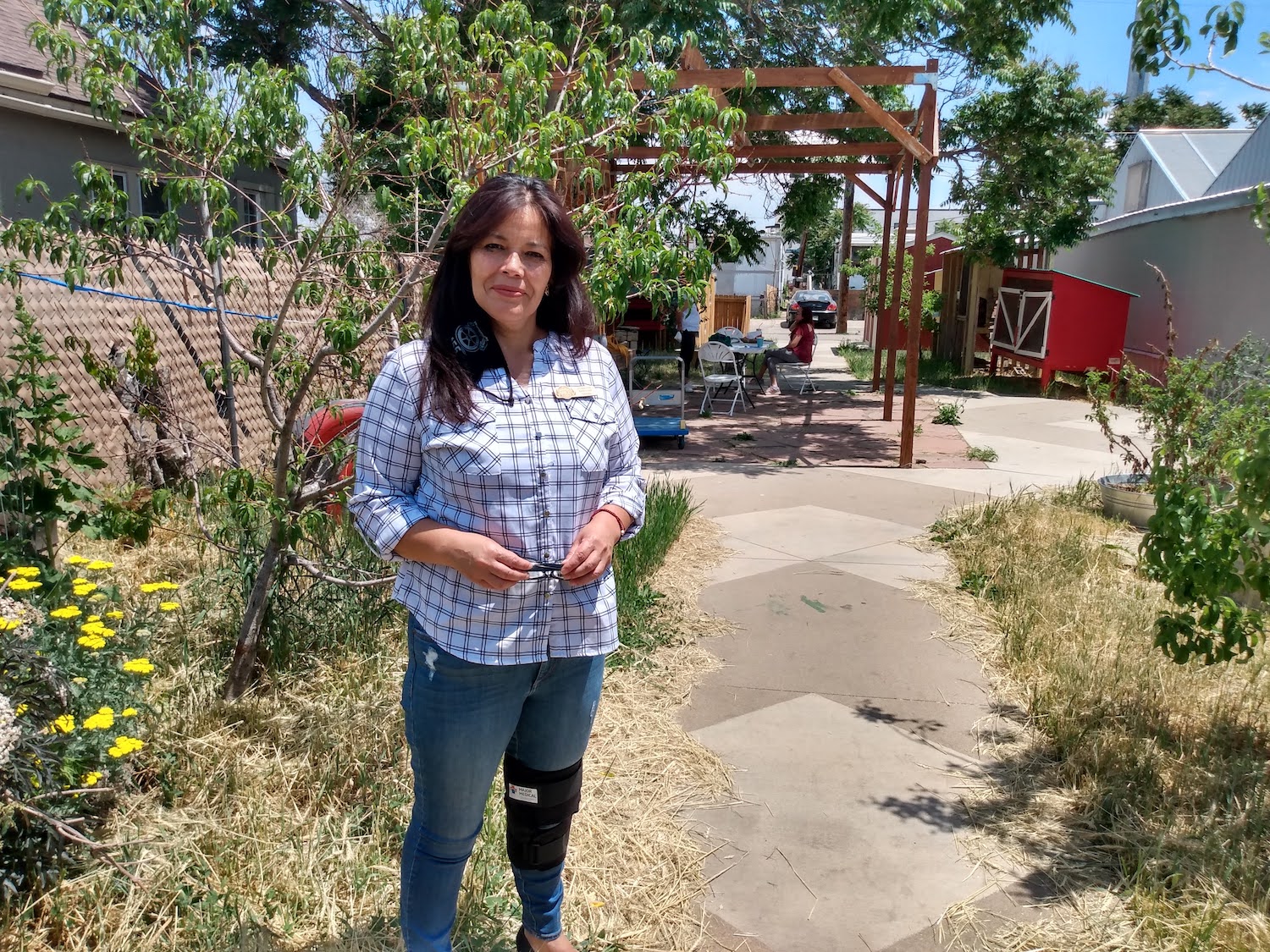
Raksha Vasudevan
In this part of the city, some residents increasingly fear hunger and deportation. But promotoras—a type of community health worker active in Latinx communities for decades—can help in places that other social services fail to reach.
In early March, as the Covid-19 pandemic disrupted air travel across the U.S., Ezequiel Martin Alcala’s hours driving shuttles at the Denver International Airport were cut—a sudden, dramatic drop in income. Instead of calling unemployment services, his family turned to an alternative source of support: Guadalupe Rodriguez, a trusted figure who had helped Alcala’s wife, Elida Hermosillo, with cooking classes and meal prep strategies.
Rodriguez is a promotora, a type of community health worker active within Latinx populations across the U.S. (The term is short for promotora de salud, or “health promoter,” with most organizations now using the term “promotores” to include all genders.) To an outsider, Rodriguez might be a surprising person to ask for help with an acute financial crisis: Her work focuses on supporting wholesome cooking and physical well-being. But promotores usually live within the communities they serve, and tend to be nimble, proactive, and well-connected advocates. In situations where language, culture, or immigration status are a barrier to more formal forms of aid, they’re routinely a first line of defense.
Above: Guadalupe Rodriguez, a Growhaus promotora known for helping with cooking classes and meal prep strategies, has been a first line of defense for many north Denver families during the Covid-19 pandemic.
Rodriguez is employed by GrowHaus, a non-profit indoor farm, low-cost marketplace, and educational center working to improve food security in Elyria-Swansea and Globeville, two neighborhoods in north Denver. The fact that a food justice organization employs four promotoras, Rodriguez and three others, is notable: The model is often, though not always, used to address issues like mental health, women’s health, domestic violence, and substance abuse. Yet promotores tend to cater their efforts to what their communities most need, whether it’s help with gambling addictions or dental hygiene. In north Denver, it means addressing issues of food access and affordability: A 2014 survey found that about 34 percent of residents in Elyria-Swansea and Globeville are food insecure, more than 6 times the citywide average.
While the Covid-19 pandemic has made GrowHaus’s mission all the more urgent, it has also fundamentally changed the nature of its promotoras’ work. It’s meant the rapid scale-up of a free food box program that feeds thousands of residents in North Denver, using the promotoras’ privileged position to identify need, increase outreach, and pack hundreds of boxes. That’s a notable success: Social services can struggle to reach the Latinx community, since seeking assistance can come with unacceptable risks. But the pandemic has demonstrated the value of the promotore-driven approach. As the economic and health crises have worsened in north Denver, GrowHaus’s community members have a clear idea of where to turn—and have not hesitated to accept critically needed help.
The delivery program has also led to a new job for Alcala, who—thanks to a referral from Rodriguez—has started driving for the company that delivers GrowHaus’s boxes.
“Now, he’s working for them,” his wife, Hermosillo, said. “It’s beautiful, I think, because he’s from the community and now he’s serving the community.”
—
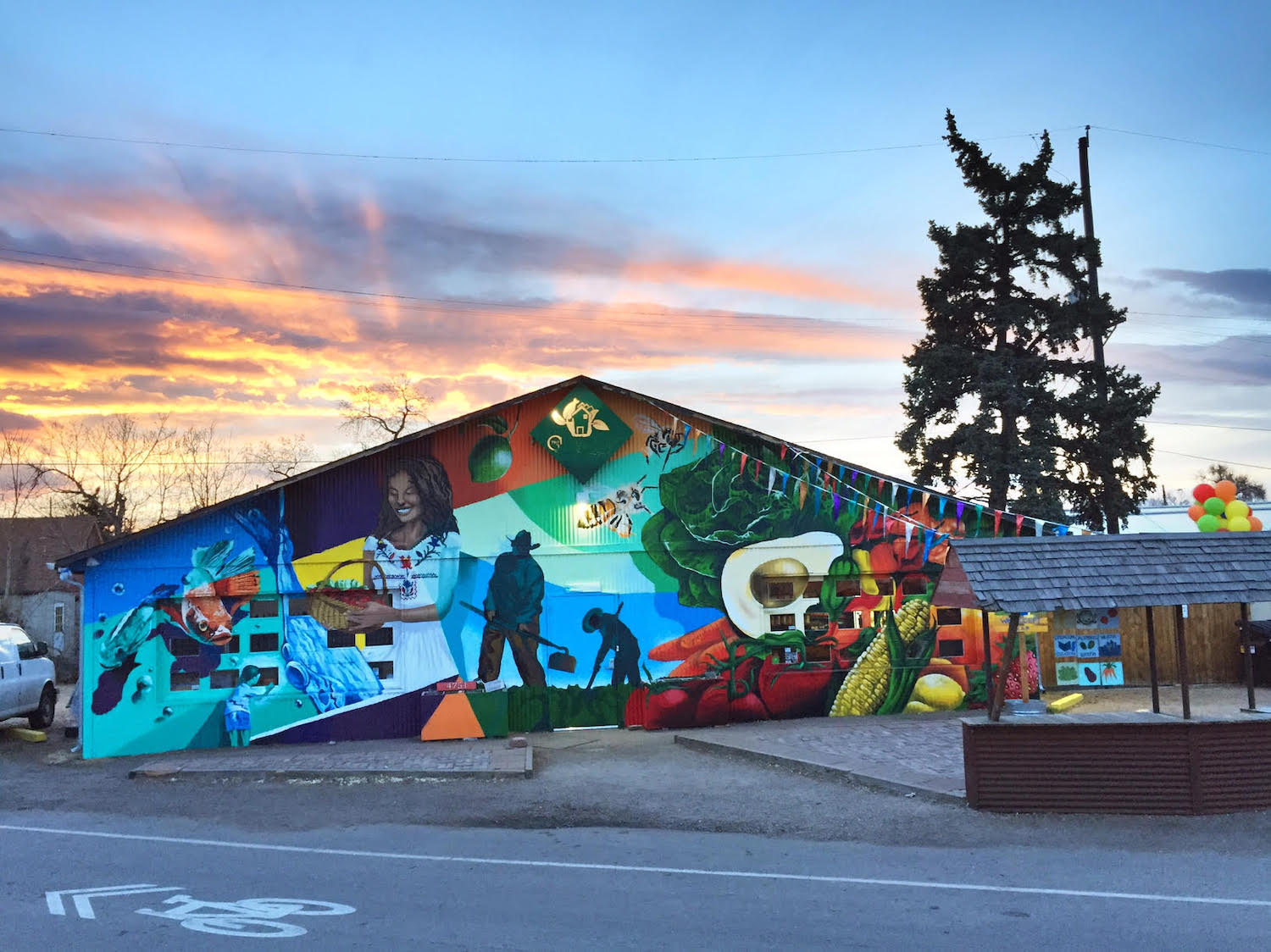
While 80 percent of food-insecure Latinx families in Colorado declined a referral to an outside food aid organization, according to a 2018 study, residents have not been reluctant to turn to GrowHaus for help. Above, the GrowHaus’ facility in north Denver—the site of an urban farm and low-cost food market until it was shuttered this spring.
GrowHaus
Promotores have acted as liaisons between communities, health professionals, and social service agencies in Mexico since the 1970s. They gained traction a decade later in the U.S., when promotores started providing health assistance to migrant farmworkers in agricultural communities from Michigan to the Mexico-Texas border—helping workers develop strategies to avoid heat exhaustion while increasing access to food and medical care. Soon, research validated promotores’ effectiveness in increasing health outcomes for Spanish-speaking communities—a group with some of the largest health disparities compared to the white population.
Promotores’ deep understanding of cultural norms and strong relationships with community members engenders a profound sense of trust. According to Visión y Compromiso, a California nonprofit that has been training promotores for 20 years, this trust is what makes the model so successful—and so versatile. “It is the quality of the relationships, not a particular issue area, which has the potential to create community change,” the organization writes, in a document explaining its model. Visión’s promotores have worked on issues ranging from internet education and energy conservation to gambling to pregnancy and oral heath. More recently, promotores have been deployed by the CDC and FEMA in campaigns to fight Zika virus, improve cervical cancer screening rates, and build emergency management capacity in the Latinx community.
“Promotores have a role to play from pre-conception to death,” said Maria Lemus, Visión’s Executive Director. “Whether it’s talking about preconception and pregnancy issues, or issues that adolescents face, or early or later adulthood, menopause and eventually death, promotores can offer a lot of resources.”
“Most of the community here uses their body a lot—they have physical jobs, they take care of kids and the house. The salves help them find some relief.”
GrowHaus’ contribution has been to apply the model to food-centered outreach and education, including home visits with families and facilitating classes at GrowHaus’ building. The organization’s four promotoras aim to build relationships with community members while sharing information on healthy eating and cooking, natural medicines, gardening, and composting.
Dolores Alfaro, who has lived in Elyria-Swansea for 28 years, says the most useful thing she learned is making natural medicines for pain and inflammation, which has cut down on her doctor visits. Karla Olivas, another GrowHaus promotora, loves teaching this module. “GrowHaus is all about health, but not just about eating,” she said. “Most of the community here uses their body a lot—they have physical jobs, they take care of kids and the house. The salves help them find some relief.”
During one of Lupe’s home visits, she guided Elida on cooking with healthy oils. “At the end, Lupe offered a little taco with the vegetables we had cooked to my eight-year-old son, and I was thinking, he’s not going to eat it because it had salad and vegetables on it,” says Elida. “And he ate it! He was like, ‘this is so delicious. I want more.’ And now, he’s always asking for those tacos I cooked with my friend.”
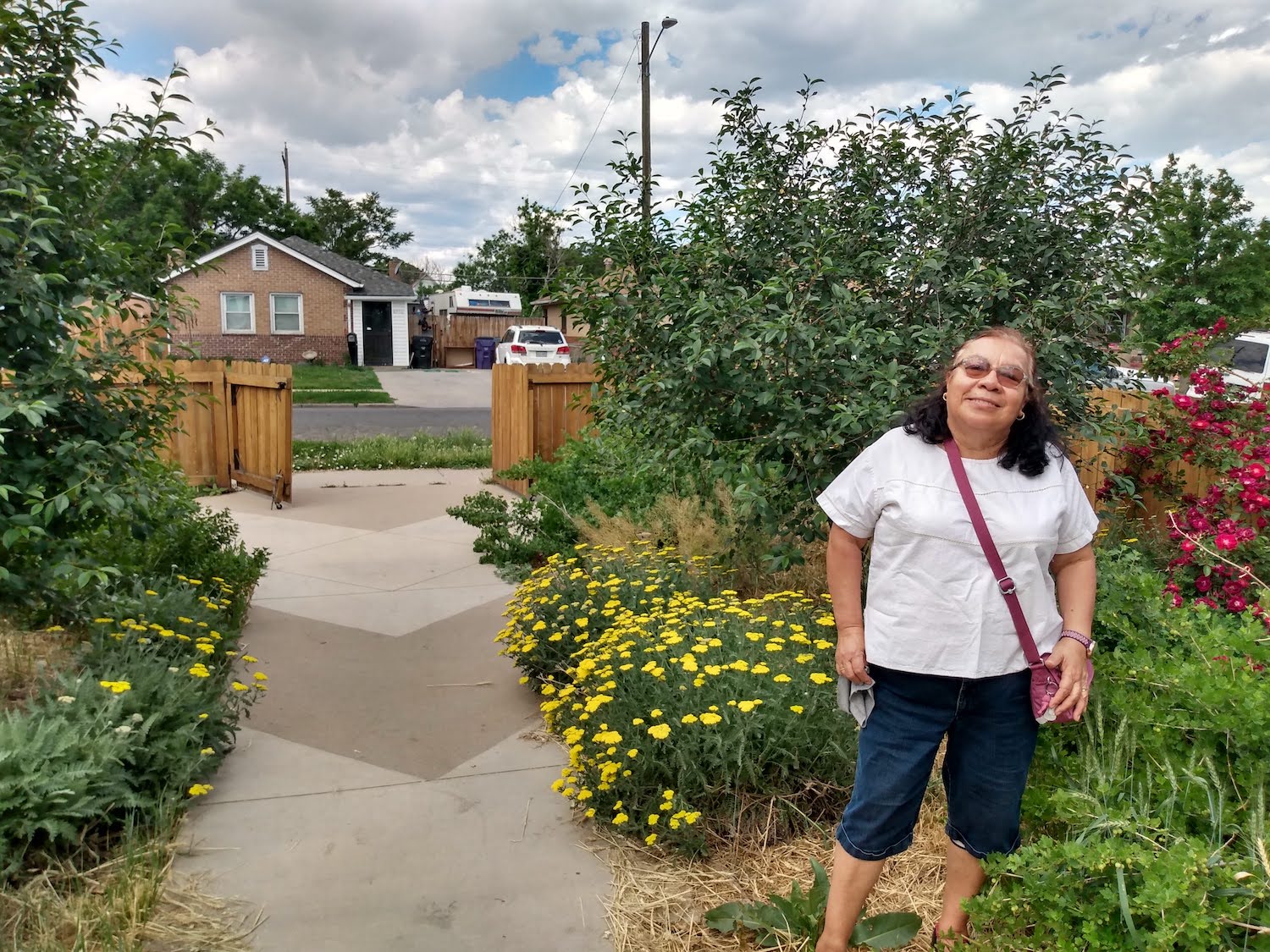
Dolores Alfaro, a north Denver resident who has worked with a GrowHaus promotora, says the most useful thing she learned is making natural medicine for pain and inflammation.
Raksha Vasudevan
It might sound trivial, but consider the dynamic discussed in a GrowHaus white paper: Women in Elyria-Swansea are the primary food shoppers, but “if a woman wants to shop for healthier food, if her husband and children do not like the food, it will become wasted, a huge risk in a financially strained family.” Data from the non-profit health advocacy group LiveWell Colorado showed the neighborhood’s Latina women were most likely to buy food according to their partner and children’s preferences, validating the promotoras’ efforts to cultivate healthy, culturally appropriate cooking habits as part of ensuring food security.
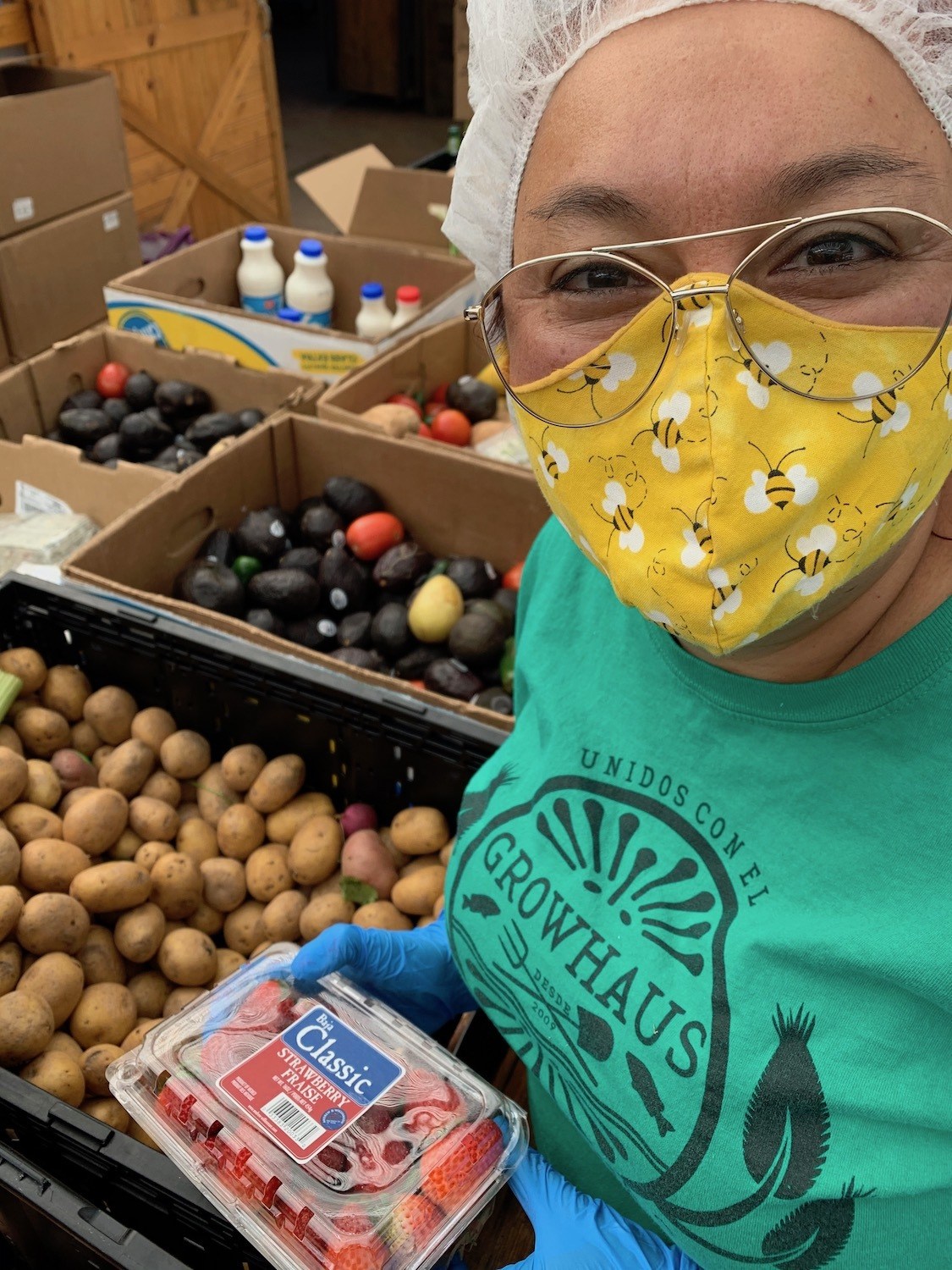
GrowHaus
Karla Olivas, one of GrowHaus’s promotoras, packs rescued produce as part of the organization’s “Rapid Reponse” program—an initiative that has helped to bring weekly boxes of free food to hundreds of north Denver residents during the Covid-19 pandemic
This deep understanding of cultured gender norms is also why GrowHaus’ promotoras are all female. “One of the things with the Latino population that we’re serving is that the men, you know, get jealous,” said Isabel Sanchez, Growhaus’s former director of programming, smiling. “They’re not willing to let a guy come into the house while they’re at work. It’s an interesting concept to respect because, you know, in America that does not apply, women are independent. … But in our Latino culture, it’s very real and can cause a lot of damage for the woman. So, GrowHaus wants to honor that and be cautious with that. We want to support the families, not create more burdens or distrust.”
The support doesn’t stop with food, though. When emergencies befall a family, like what happened with Alcala, the promotoras are there to help. Difficult conversations—now, phone conversations since the pandemic took hold—are a staple of the work.
“Clients feel safe with our teams,” said Sanchez. “They become family. They call at seven o’clock in the evening and say my husband got deported or I’m going through this, so, you know, it’s pretty heavy.”
—
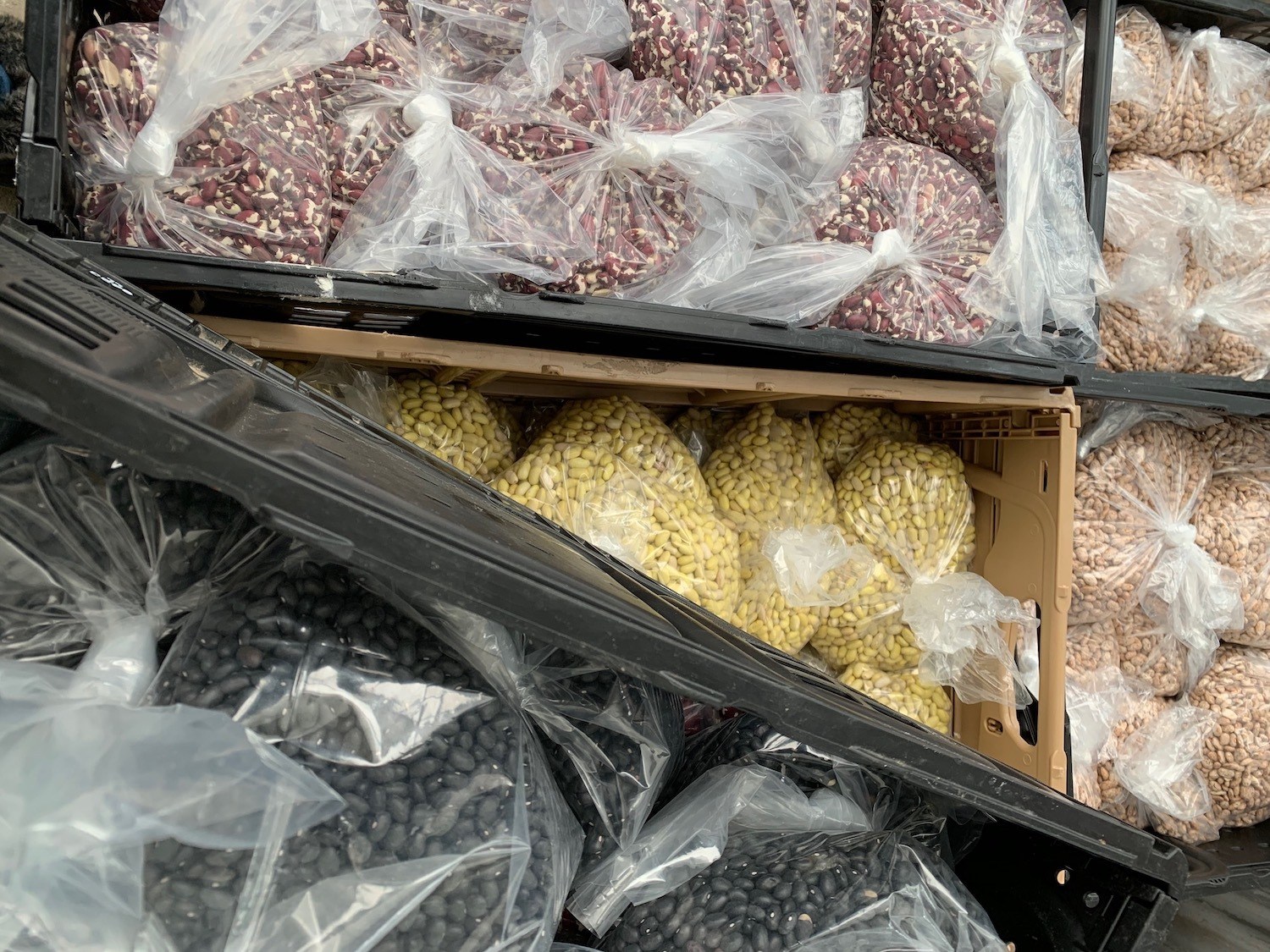
Dry goods to be packed and distributed as part of the Rapid Response food boxes— including rice, beans, flour, and tortillas
GrowHaus
North Denver residents are more likely to face economic challenges even in normal times. For many, the Covid-19 pandemic has made daily reality even more tenuous. Alfaro, for instance, has seen family members’ hours cut at the post office and the hospital. The weekly food package that GrowHaus now delivers to her house is not enough to feed her family of seven, she says, though it’s a huge help.
Earlier this year, GrowHaus was delivering only 20 to 25 boxes per week to families who could not physically make it to its weekly no-cost grocery market (which served about 50 families). As the pandemic started decimating jobs, another crisis hit: in early March, GrowHaus’ building was closed to the public for not meeting city safety standards. This also spelled the end of its weekly no-cost food market and on-site farm even as promotoras—in frequent contact by phone with community members—reported deteriorating food security in the neighborhoods that GrowHaus serves.
At the same time, demand for GrowHaus’ paid food boxes, like for many CSA-type services, skyrocketed, from 200 customers across Denver to 1,227 households. The profits from this program (handled by another team that does not include promotoras) help to subsidize a no-cost food package program for north Denver residents, also funded by grants. Through GrowHaus’s online purchasing platform, paid food box customers have also donated over 2,000 boxes on top of their purchases.
While 80 percent of food-insecure Latinx families in Colorado declined a referral to an outside food aid organization, according to a 2018 study, residents have not been reluctant to turn to GrowHaus for help.
In March, GrowHaus launched “Rapid Response,” a program that would scale up its offer of free food packages delivered to residents of zip code 80216, the area that includes Globeville and Elyria-Swansea. Promotoras scrambled to call every 80216 resident who had participated in GrowHaus programming to see if their family could use the no-cost food package, meant to feed a family of four for a week. Along with advertising the program on social media, they asked families they called to refer anyone else who might need this service to GrowHaus. Demand has been tremendous, with 543 families signing up, three-quarters of whom had never used GrowHaus’ services before. As of mid-July, GrowHaus was providing food to 18% of the neighborhoods’ 2,958 families—a more than twentyfold increase.
This demand speaks to the unusually deep trust that GrowHaus has developed in the communities it serves. While 80 percent of food-insecure Latinx families in Colorado declined a referral to an outside food aid organization, according to a 2018 study, residents have not been reluctant to turn to GrowHaus for help.
With registrations flooding in, the promotoras’ jobs shifted almost entirely to packing food packages, which contain a mix of dry goods (i.e. rice, beans, flour, and tortillas; purchased) and produce rescued from grocery stores by their partners. Since March, promotoras have packed over 6,000 no-cost food boxes.
“The promotoras who we hire from the neighborhood and train is the most transformative way that we have integrated with the community.”
“That response would not have happened if we had not spent over a decade developing trust in our communities,” said Kayla Birdsong, GrowHaus’ Executive Director. “The promotoras who we hire from the neighborhood and train is the most transformative way that we have integrated with the community.
The surge in need is due, in part, to the fact that these communities have been hit especially hard by the pandemic: as of July 17, Elyria-Swansea had 2.9 hospitalizations and Globeville 2.5 hospitalizations per 1,000 people—significantly higher than Denver’s wealthier neighborhoods like Cherry Creek where hospitalization rates hover around 0.8 per 1,000 residents. Since March, GrowHaus’ promotoras report that families and especially older people are feeling isolated on top of having trouble making rent and utility payments. Promotoras refer them to services available through other agencies—but even this is complicated.
“Many community members here don’t have the privilege of applying for government benefits because of their undocumented status,” Rodriguez explained. As of 2011 (the latest year for which data is available), more than 1,200 people in Elyria-Swansea were eligible for the Supplemental Nutritional Assistance Program (SNAP, formerly food stamps). This makes GrowHaus’ Rapid Response, which does not require any identification for registration, all the more valuable.
While food banks also generally do not require identification, they rarely have enough fresh produce for all their clients. And even residents who can afford fresh produce don’t have many options. As a 2015 study found, Elyria-Swansea “is a food swamp: a neighborhood that lacks access to healthy food but is saturated with unhealthy options such as fast food and convenience stores.” Community members confirm that remains true today.
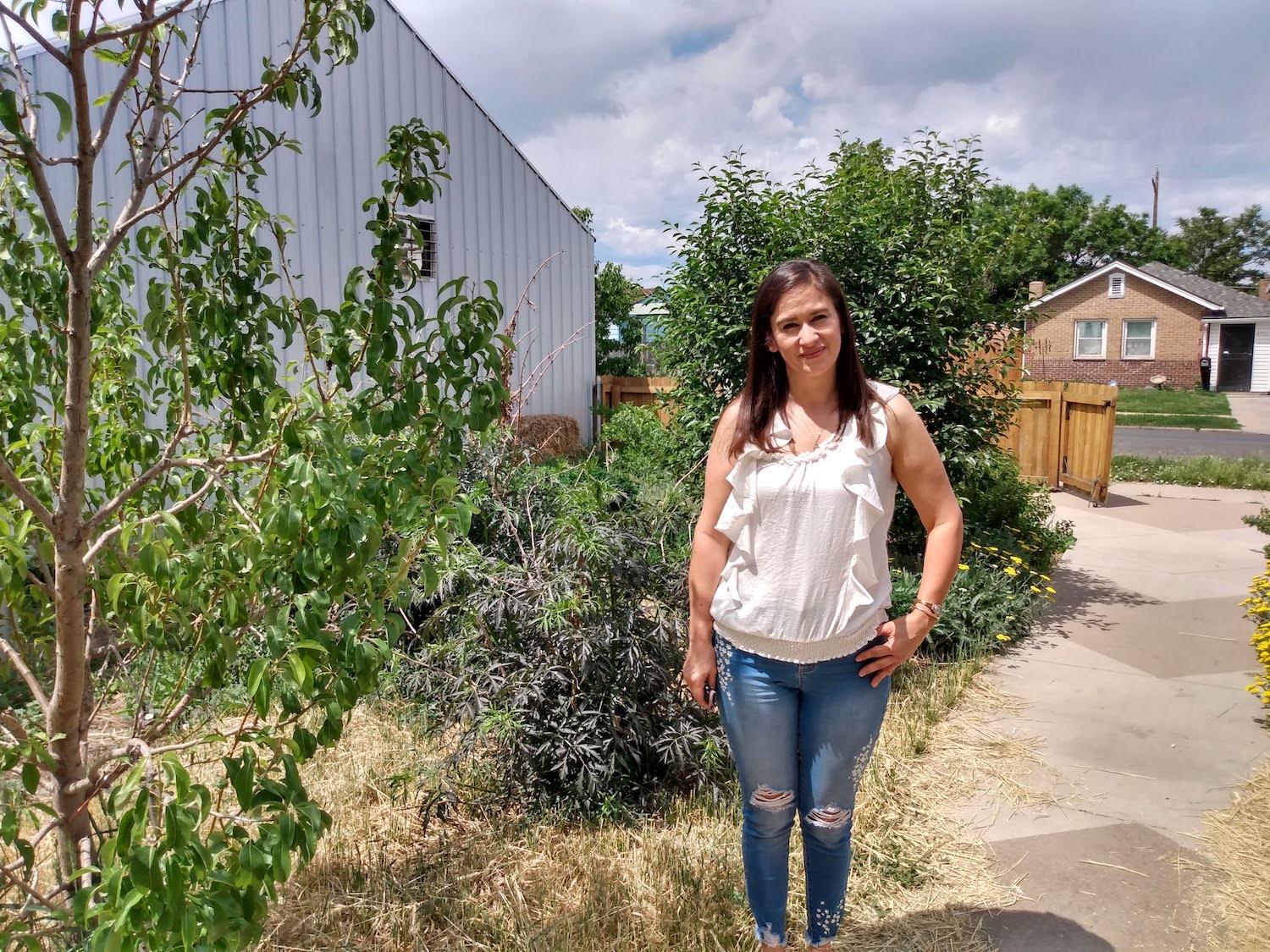
Elida Hemosillo, a resident of Denver’s Elyria-Swansea neighborhood, received help from GrowHaus promotoras after her husband’s hours were cut from work
Raksha Vasudevan
On top of that, growing food is nearly impossible in the neighborhood. “The soil in my yard is very poor, actually contaminated from the I-70 [highway],” said Hermosillo. “So it’s impossible to grow vegetables there. But I’m trying to revive it by using the compost [I learned to make at GrowHaus] to feed the soil.”
—
Despite residents’ objections, Interstate 70 was built directly through Elyria-Swansea in the sixties. The construction of the highway made the neighborhood part of the Vasquez-I-70 Superfund site, identified by the EPA as contaminated with pollutants and hazardous material. This contamination, and emissions from the neighborhood’s many industries (including two refineries, a petroleum terminal, a coal-fired power plant and solvent-based business) has made Elyria-Swansea one of the nation’s most polluted neighborhoods, with asthma rates jumping by 41% between 2006 – 2010 and 2013 – 2017. All of this, of course, exacerbates residents’ risk of suffering serious complications from Covid-19.
Unsurprisingly, this history of marginalization has made residents wary of outsiders. “This is a neighborhood that’s very difficult to gain trust in and one that’s been over-promised and underserved for decades,” Birdsong acknowledged. The promotoras have been key to building this trust with GrowHaus.
“The home visits have really allowed us to build bonds with community members,” says Rodriguez. Sanchez adds that sometimes, families don’t have running water or ingredients to cook with. “We bring our own supplies. We meet them where they’re at.”
Moises Arjona Jr., the Chief Officer of Programs at MHP Salud, agrees this bond is key to promotores’ effectiveness. “Once that bond is formed, participants feel they have someone to guide them through different systems,” he said. MHP, which started in the migrant worker camps of the 1980s, now has promotores working in Texas and Florida on a range of issues, including sexual assault and domestic violence, senior citizen fall prevention, and assistance in enrolling for benefits. Home visits establish each promotore as a focal point for families to contact on any issue, even after a specific program has ended. “Just because the funding stops doesn’t mean our work stops,” he said.
The promotores program is also meant to develop leadership in community members. GrowHaus usually recruits from the women who attend their classes—women in the community who are already “involved and engaged,” as Sanchez says. Since they join GrowHaus with varying levels of professional experience and formal education, GrowHaus works on building their soft and hard skills.
Olivas, who came to know GrowHaus after enrolling her children in a beekeeping class there (and eventually, herself in a healthy cooking class), says her job has taught her how to be in relationship one-on-one with people. Rodriguez adds the job has helped build her confidence and learn “how to speak the language of the community, who also have a lot to teach us.” Eventually, she’d like to set up workshops led by community elders to share their knowledge of ancestral foods and medicine.
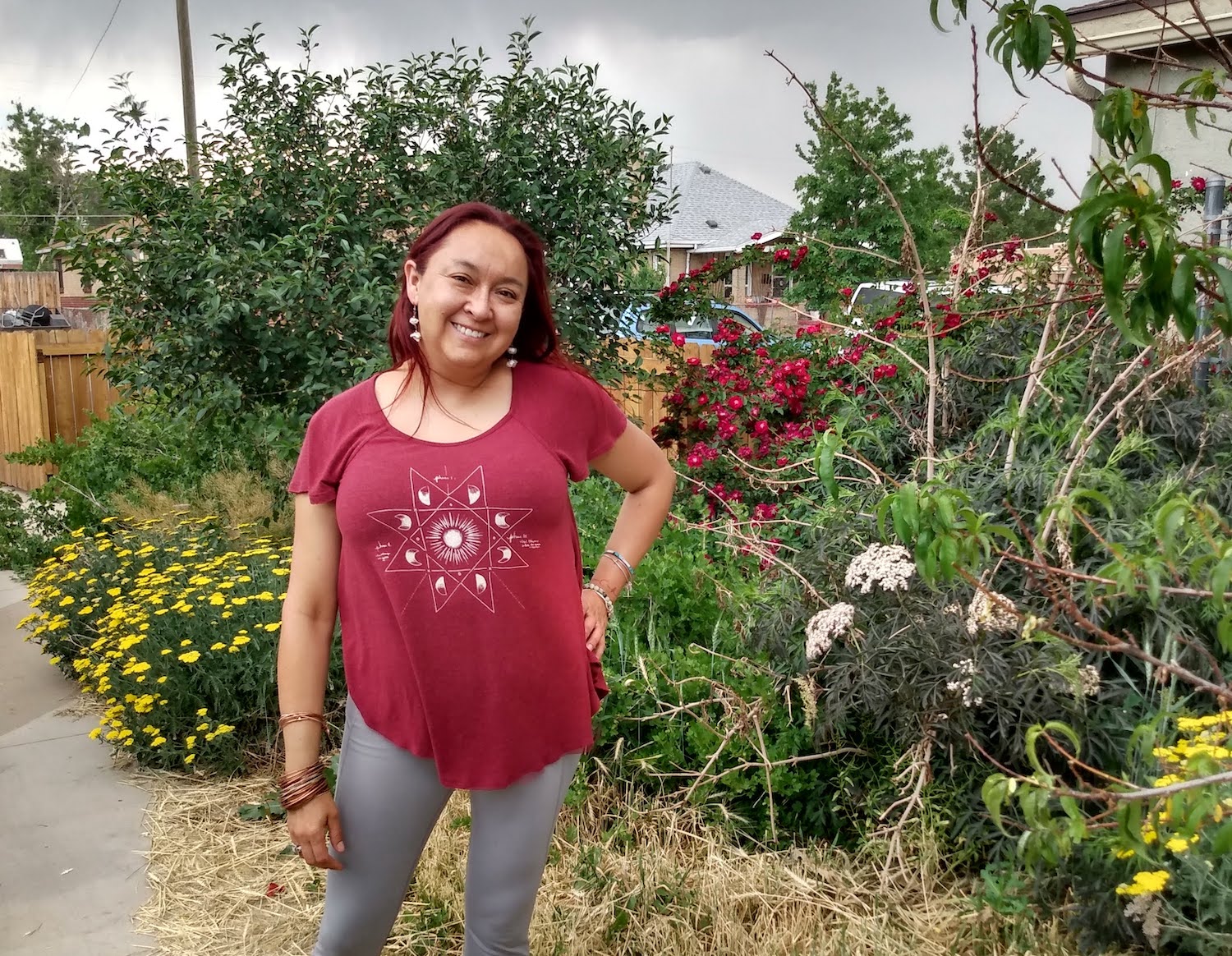
Karla Olivas, one of GrowHaus’s four promotoras, came to know the organization after enrolling her children in a beekeeping class there.
Raksha Vasudevan
GrowHaus is also planning to hire two apprentices to be trained by its promotoras. This will enable GrowHaus to potentially serve more communities, and offer another form of leadership development for the promotoras.
Visión y Compromiso has taken leadership development for its promotores even further. Former promotores make up most of its staff, including Maria Lemus, its executive director. And 15 years ago, they started training promotores in advocacy—an effort that continues to this day. “We wanted to show that even if you’re an immigrant, you have the right to advocate,” Lemus said. “We went to Sacramento, the capital. They would look at bills and proposals and walk the halls talking to their legislators. Now, they advocate locally also at the city and county level.”
While GrowHaus has been involved in advocacy in the past, its priority is getting promotoras back to outreach and education. To that end, GrowHaus is hiring packing support for the food packages. As an immediate next step, this will free promotoras to call all 533 families signed up to see how Rapid Response has been working for them and to gauge their other needs. And, as Karla says, “just to check in. You know, I miss the families [too]. I need them.”
Overall, management and staff worked hard to meet the surge of need brought about by the pandemic—but they feel that the sudden influx of new challenges has only strengthened their ties within the community. “So many new families have signed up for the Rapid Response, some of whom we already knew and many we didn’t,” said Rodriguez. “So, going forward, we hope to continue those relationships and engage them in our classes, children’s programming, and so on. We don’t know what those will look like. But we will continue.”
